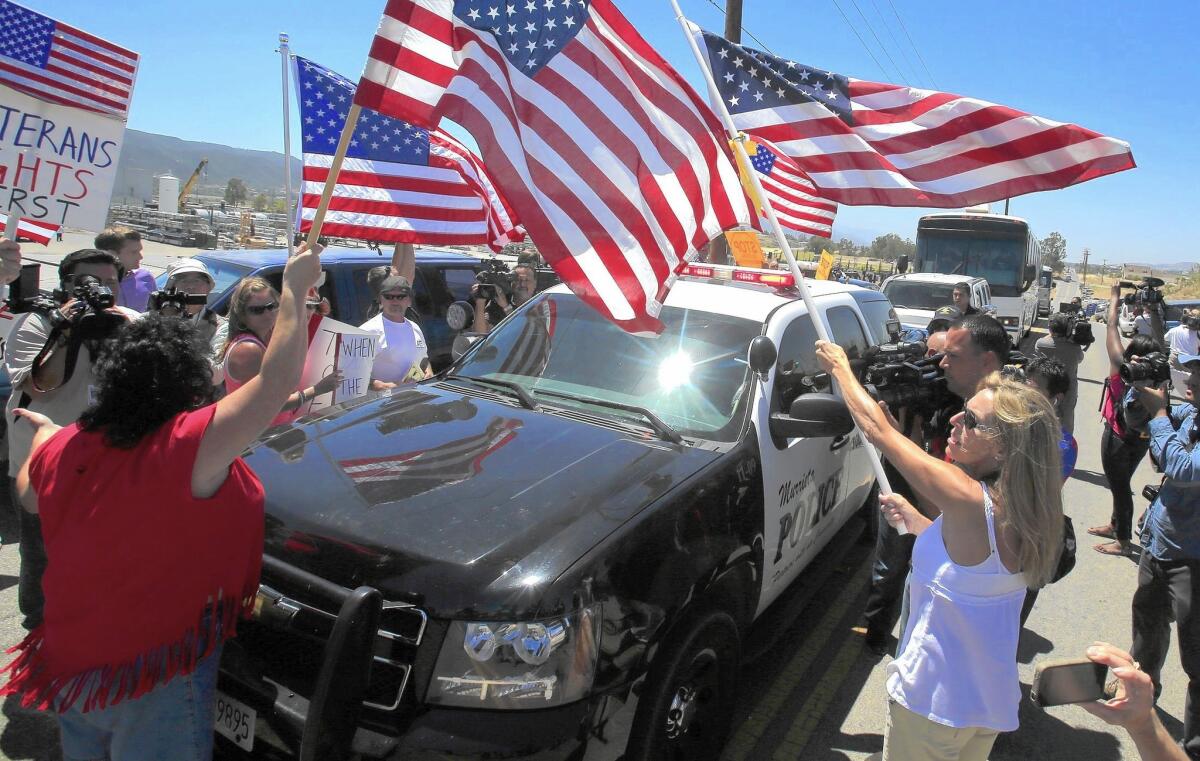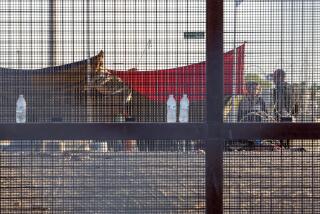In court, ‘guardian angels’ aim to help immigrants facing deportation

Inside a small immigration courtroom, a handful of children and teenagers wait for their moment before a judge.
Some are accompanied by a relative or a lawyer. Others are alone. Judge Ashley Tabaddor moves through the deportation hearings quickly.
“Sir, you really need to educate yourself about the option of special immigrant juvenile status,” she tells a man who is there with his young son.
“You have to be here at the next hearing,” she instructs an unaccompanied teenage girl. “Or I will have to order you removed in your absence.”
In the first row of the seating area, Maria Paiva quietly scribbles on a pad of paper. Dressed in a T-shirt that depicts an angel hovering over two small children, Paiva is here to record any inconsistencies in the court proceedings. While she watches, two other volunteers wearing matching shirts take turns approaching young immigrants after their hearings to offer information about free legal and social services.
They call themselves “guardian angels.” They say they are protectors of the tens of thousands of children apprehended at the U.S. border in recent years after fleeing rising violence in Central America.
Because the government does not provide lawyers to immigrants facing removal, many of the children have ended up navigating complex deportation proceedings alone. Last fiscal year, 72% of children in deportation hearings were not represented by an attorney, according to federal data analyzed by Syracuse University’s Transactional Records Access Clearinghouse.
“They don’t understand what their rights are,” said Paiva, who emigrated from Peru in the 1980s. “I want to make sure that the judge knows I am there, taking notes.”
Paiva leads the program with Alexia Salvatierra, a Lutheran pastor who hatched the idea last summer after hearing that children’s deportation hearings were being fast-tracked through the court system.
More than three-fourths of children’s court cases closed in the second half of last year resulted in removal orders, according to the federal Executive Office of Immigrant Review. In the vast majority of those cases, the deportation orders were issued in absentia because the children did not show up for their hearings.
Tens of thousands of cases are still being processed by the courts, with some on hold as the children apply for asylum through U.S. Citizenship and Immigration Services or seek other forms of relief.
The volunteers — mostly clergy or lay people from the Lutheran Church or other faiths — have been trained by the National Lawyers’ Guild to monitor possible violations of the children’s legal rights. They fill out forms to track the time frames given by judges for finding a lawyer or for various parts of the asylum process.
“You become a witness in a very important way,” Salvatierra said. About 40 volunteers have been trained so far.
The program is one piece of a larger humanitarian response by Southern California’s religious community.
After protesters favoring stricter immigration enforcement turned away busloads of recently arrived women and children near a Border Patrol processing station in Murrieta last summer, a coalition of faith leaders and service providers sat down in Los Angeles and plotted their own course of action.
“It’s more than legal representation,” said Guillermo Torres, whose group, Clergy and Laity United for Economic Justice, helped organize the meetings. “There’s a whole support network that needs to be built around them.”
Months later, many of their initiatives are getting off the ground.
The Episcopal Diocese has begun training volunteers to help the children and their families locate mental and health services. The Methodist Church has created a network of community centers where immigrants can receive emergency food and attend free legal clinics. The church is also planning a summer camp for the recent arrivals.
Federal data show that in the last year and a half, more than 3,200 children detained alone at the border have been released to guardians in Los Angeles County while they face deportation proceedings. But locating the children for outreach isn’t easy.
One place volunteers are likely to encounter them is at immigration court.
The guardian angel volunteers sit in twice a week on immigration hearings, held on the top floors of a nondescript office building near Pershing Square. Before they enter, they don their shirts, which feature a popular image of an angel that many Christian Latinos hang above children’s beds for protection.
Often, they pray that God will guide them to the families that need help the most and that “the judge will have a soft heart, not a hard one.”
On a recent afternoon, Torres, Paiva and a third volunteer, Jessica Carroll, took seats in Tabaddor’s courtroom. The judge took a hard line on several immigrants who arrived without a lawyer, including a woman who hadn’t hired an attorney to represent her 11-year-old son even though Tabaddor had previously given the boy a continuance so the mother could find one.
“I don’t have the money,” said the woman, a strawberry picker in Oxnard. She paid a smuggler to bring her son north from El Salvador last summer after he was abused by a family member and gang violence started growing.
“Well ma’am, we gave you a list of legal aid providers,” the judge responded. “So I’m trying to see what did you try to do to get an attorney, especially when you were given a list of 30 of them that wouldn’t cost anything.”
The woman started weeping, and Tabaddor told her she could have a few minutes to leave the courtroom and make calls to lawyers.
Torres and Carroll, the volunteers, met her in the hallway.
“I don’t want to be separated from him,” the woman said, her chest heaving.
“I know,” Carroll said. A Salvadoran immigrant who was brought illegally to the U.S. as a child, Carroll now works as a legal secretary.
While Carroll comforted the mother and son, Torres got on the phone, calling attorney friends who owed him favors. One agreed to represent the boy.
When the woman returned to court, she provided Tabaddor the name of her new attorney, and her son was given another continuance.
After the hearing, she embraced Torres and Carroll, who handed her a small card with information about accessing other services. On the back was the image of an angel.
Twitter: @katelinthicum
More to Read
Start your day right
Sign up for Essential California for news, features and recommendations from the L.A. Times and beyond in your inbox six days a week.
You may occasionally receive promotional content from the Los Angeles Times.







